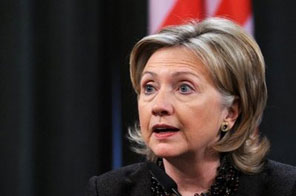Clinton, Netanyahu seek to defuse US-Israeli row
WASHINGTON: US Secretary of State Hillary Clinton and Israeli Prime Minister Benjamin Netanyahu are set to meet and deliver speeches here Monday in a test of whether the worst US-Israeli crisis in years has been defused.
In the runup to their appearances at the American Israel Public Affairs Committee (AIPAC) annual policy conference in Washington, the pair have sounded conciliatory notes over a row over new Jewish homes in east Jerusalem.
Clinton demanded and received a response from Netanyahu -- which came while she was in Moscow to consult with international partners on the peace process -- about US concerns over the impact of the settlements.
"What I heard from the prime minister in response for the request we made was useful and productive, and we're continuing our discussions with him and his government," Clinton told reporters in Moscow on Friday.
However, Netanyahu on Sunday stood by his right-wing government's plans for the homes in mainly Arab east Jerusalem, which had angered an Obama administration that had worked so hard to revive Israeli-Palestinian peace negotiations.
The Palestinians called off the newly agreed indirect talks -- the first of any kind since Israel's Gaza offensive in December 2008 -- after the Israeli settlement announcement on March 9.
In addition to their speeches to AIPAC pro-Israel lobby -- with Clinton scheduled in the morning and Netanyahu in the evening -- the pair are to hold face-to-face talks at the State Department during the day, US officials say.
It will be a dress rehearsal for President Barack Obama's own meeting Tuesday at the White House with the Israeli premier.
US-based analysts doubt Netanyahu will back down on the settlements because they would cause his right-wing coalition to collapse -- which they say could mean the Obama administration will lose face again.
The Obama administration last year demanded a complete halt to Israeli settlements, only to yield in the end to Netanyahu's call for a 10-month moratorium on new housing in the West Bank, but not in east Jerusalem.
The Palestinians refuse to return to direct negotiations until Israel stops all settlements, but US envoy George Mitchell managed to get both sides to agree to indirect talks -- before the new homes were announced for Jerusalem.
After Netanyahu promised some undisclosed confidence-building measures in his call to Clinton last week, Mitchell returned to the Middle East at the weekend in what US officials hope will mark the restart of the indirect talks.
A US State Department official told reporters on condition of anonymity that Clinton had a "constructive" telephone conversation with Palestinian president Mahmud Abbas before his meeting with Mitchell on Monday.
There were no details of that call, however.
Robert Satloff, the executive director of the Washington Institute for Near East Policy think tank, told AIPAC on Sunday that the crisis between the two allies is "serious" and "real" even if both sides now are trying to defuse it.
"When it is resolved -- and I think it is in the process of being resolved -- it will leave scars between the two sides, I think at the very highest levels," said Satloff.






